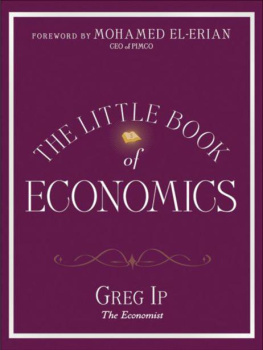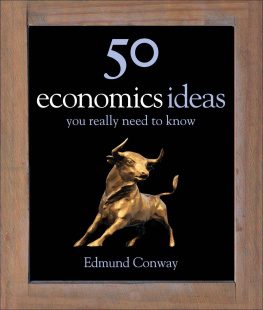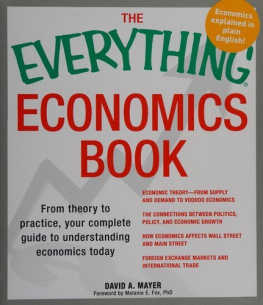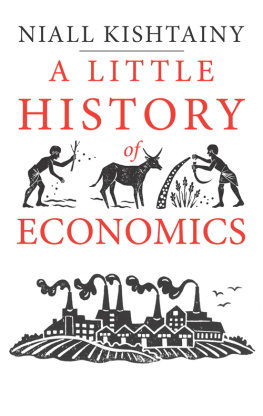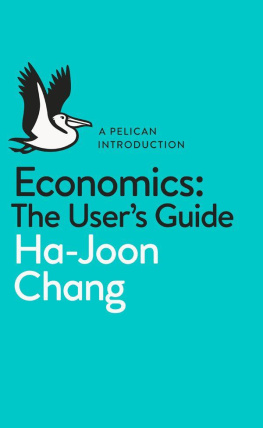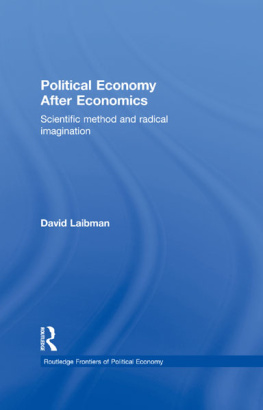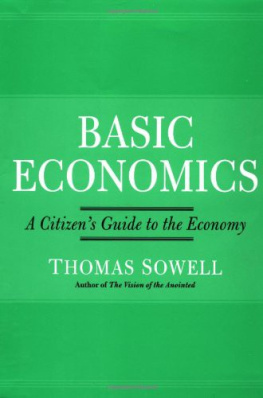Table of Contents
Additional Praise for The Little Book of Economics
Greg Ip has the rare talent of making even the toughest topics easy to understand. In The Little of Book of Economics, he tells you what you need to know with superb clarity and memorable examples. I recommend this book to anyone who wants a clear explanation of how the forces of economics shape the world.
Michael J. Mauboussin, Chief Investment Strategist,
Legg Mason Capital Management;
Author of Think Twice
The book is an excellent introduction to basic economic concepts and ideas explained in clear and thoughtful ways. A must read in economic literacy.
Nouriel Roubini, Professor of Economics,
New York University; Co-founder and
Chairman of Roubini Global Economics
Little Book Big Profits Series
In the Little Book Big Profits series, the brightest icons in the financial world write on topics that range from tried-and-true investment strategies to tomorrows new trends. Each book offers a unique perspective on investing, allowing the reader to pick and choose from the very best in investment advice today.
Books in the Little Book Big Profits series include:
The Little Book That Beats the Market by Joel Greenblatt
The Little Book of Value Investing by Christopher Browne
The Little Book of Common Sense Investing by John C. Bogle
The Little Book That Makes You Rich by Louis Navellier
The Little Book That Builds Wealth by Pat Dorsey
The Little Book That Saves Your Assets by David M. Darst
The Little Book of Bull Moves in Bear Markets by Peter D. Schiff
The Little Book of Main Street Money by Jonathan Clements
The Little Book of Safe Money by Jason Zweig
The Little Book of Behavioral Investing by James Montier
The Little Book of Big Dividends by Charles B. Carlson
The Little Book of Investing Dos and Donts by Ben Stein and Phil DeMuth
The Little Book of Bull Moves, Updated and Expanded by Peter D. Schiff
The Little Book of Commodity Investing by John R. Stephenson
The Little Book That Still Beats the Market by Joel Greenblatt
The Little Book of Economics by Greg Ip
Copyright 2010 by Greg Ip. All rights reserved.
Published by John Wiley & Sons, Inc., Hoboken, New Jersey.
Published simultaneously in Canada.
No part of this publication may be reproduced, stored in a retrieval system, or transmitted in any form or by any means, electronic, mechanical, photocopying, recording, scanning, or otherwise, except as permitted under Section 107 or 108 of the 1976 United States Copyright Act, without either the prior written permission of the Publisher, or authorization through payment of the appropriate per-copy fee to the Copyright Clearance Center, Inc., 222 Rosewood Drive, Danvers, MA 01923, (978) 750-8400, fax (978) 646-8600, or on the web at www.copyright.com. Requests to the Publisher for permission should be addressed to the Permissions Department, John Wiley & Sons, Inc., 111 River Street, Hoboken, NJ 07030, (201) 748-6011, fax (201) 748-6008, or online at www.wiley.com/go/permissions.
Limit of Liability/Disclaimer of Warranty: While the publisher and author have used their best efforts in preparing this book, they make no representations or warranties with respect to the accuracy or completeness of the contents of this book and specifically disclaim any implied warranties of merchantability or fitness for a particular purpose. No warranty may be created or extended by sales representatives or written sales materials. The advice and strategies contained herein may not be suitable for your situation. You should consult with a professional where appropriate. Neither the publisher nor author shall be liable for any loss of profit or any other commercial damages, including but not limited to special, incidental, consequential, or other damages.
For general information on our other products and services or for technical support, please contact our Customer Care Department within the United States at (800) 762-2974, outside the United States at (317) 572-3993 or fax (317) 572-4002.
Wiley also publishes its books in a variety of electronic formats. Some content that appears in print may not be available in electronic books. For more information about Wiley products, visit our web site at www.wiley.com.
ISBN 978-0-470-62166-0 (cloth); 978-0-470-92940-7 (ebk); 978-0-470-92939-1 (ebk)
To Natalie and Daniel
Foreword
IT WAS AS A 15-year-old at school in England that I was formally introduced to the subject of economics. And I immediately fell in love with it. Here was a subject that provided me with valuable tools to think about a range of topics, to formulate answers from first principles, and to pose additional interesting questions whose answers I was also eager to know.
My love affair with economics has blossomed and continues today. And I feel privileged as economics seems to be even more relevant and topical as time passes. It facilitates our understanding of the well-being of societies; it explains many of the daily interactions between individuals, companies, and governments; and it offers a guide to understanding the political and social trends that are shaping our world.
Simply put, economics is the key to understanding and analyzing both what is likely to happen and what should happen. Yet, as a topic, it is also horribly misunderstood and often overlooked.
Many believe that economics is too complex, too mathematical, and too arcane for them. Others question the benefits of investing their time and effort to get to know a subject that is the source of endless jokes, including presidential ones. (For example, President Harry S. Truman is said to have famously asked for a one handed economist, noting that all my economists say, on the one hand and on the other.)
Why am I telling you all this? Because I have come across a book that makes economics brilliantly accessible and, also, lots of fun (yes, economics can be fun!).
Forget about those heavy textbooks. Instead, read Greg Ips book. It is well written and highly engaging. Moreover, this book could not have been written by a more qualified person; and it could not come at a better time.
Greg first came to my attention, and that of my professional colleagues, through his reporting and analyses at the Wall Street Journal. We would all eagerly look forward to his columns for insights into economic developments and the outlook for policy.
Gregs work at the Wall Street Journal, and now The Economist, is based on careful, in-depth research. It uses a robust set of analytical frameworks and reflects access to top policymakers and thinkers. And it is always relevant and timely. His columns have been the catalyst for interesting discussions at PIMCOs Investment Committee as we all tried to better understand developments and detail our shared outlook for the economy and markets.
In his elegant book, Greg takes us on an informative and stimulating economic journey. We make multiple stops as we get exposed to basic topics (such as the drivers of economic growth and welfare) and delicate balances (such as the tug of war between inflation and deflation). We learn about how government actions impact the economybe it through the familiar channel of public finances and interest rates, or the more complex web of regulations and prudential supervision.




